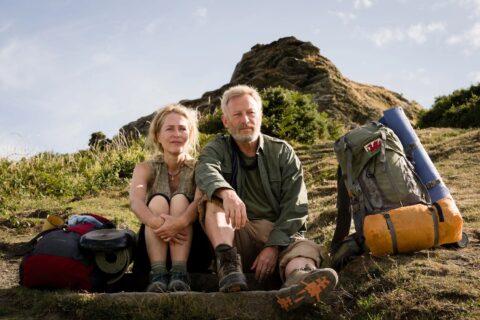Whether it’s Hinge profiles or office icebreakers, who doesn’t love to say that they love a “long walk?” I’m partial to a big hike myself, as long as I don’t have to stay in a tent and I can stop for a beer every couple of hours. But long-distance walking goes a bit deeper than that. At your most stressed or burned out, going out by yourself can help you arrive at a decent solution. Or, at the very least, some much-needed perspective.
This is what inspirational tale The Salt Path (Marianne Elliott, 2024) — following in the path of similar stories like Wild (Jean-Marc Vallée, 2014) and The Way (Emilio Estevez, 2010) — offers in spades, using its couple’s journey along the 630-mile South West Path, snaking through Somerset, Cornwall and Devon, to provide a deeply-meaningful lesson in love, pain and perseverence.
While boasting a beautiful tour of the extremities of the British countryside and two dutiful performances from Jason Isaacs and Gillian Anderson, Elliott’s film debut (after a storied career in the theatre) never rises above mere pleasantries into something either interesting or profound. While there’s nothing particularly bad or objectionable about the material, it doesn’t offer much more than just following your average influencer livestream a big walk on social media.
The film is based on the true story of Raynor and Moth Winn1I have to now add this footnote in the light of recent news that a large portion of this story has possibly been fabricated! Wild. (played by Anderson and Isaacs, respectively). Similar to the tragic backstory surrounding Wild, Raynor was inspired to do the journey when she and her husband Moth, diagnosed with the rare incurable disease Corticobasal degeneration, were evicted from their farm after a business deal gone wrong.
Unlike my idea of a walking holiday — with many stops in pubs, hotels and the like; hot dinners, even hotter showers, etc, etc — they must make do with just the £40 a week they receive in tax credits. And with just a tent in their back, they wild camp along the coast, battling rain, waves and angry farmers along the way, living mostly off tea and instant noodles. Sadly, while Isaacs and Anderson try their best to bring this struggle to life, the actors’ luxury accommodation never feels far away.
The film is at its most interesting when it serves as a tour of odd Britain, a place alive in fascinating characters and weird and wonderful details, whether it’s the posh family, led by an excellent James Lance, that mistake Moth for Poet Laureate Simon Armitage, the hippie commune that seems to exist solely on weed and vibes, or eccentric Englishmen waxing lyrical about the magic of sea-salted blackberries.
Sadly, these moments don’t make up for Rebecca Lenkiewicz’s mostly lacklustre script. Like the Berlinale bomb Hot Milk (2025), she is constantly trying and failing to find constant moments of profundity, occasionally landing on something meaningful but most of the time holding us at a remove, lest we feel too deeply. The direction is equally pedestrian, trying for wild and sweeping panoramas — drone footage, aspect ratio changes! — but failing to immerse us in the elemental forces of countryside life. This salt path will be one less taken.
Redmond is the editor-in-chief of Journey Into Cinema.

